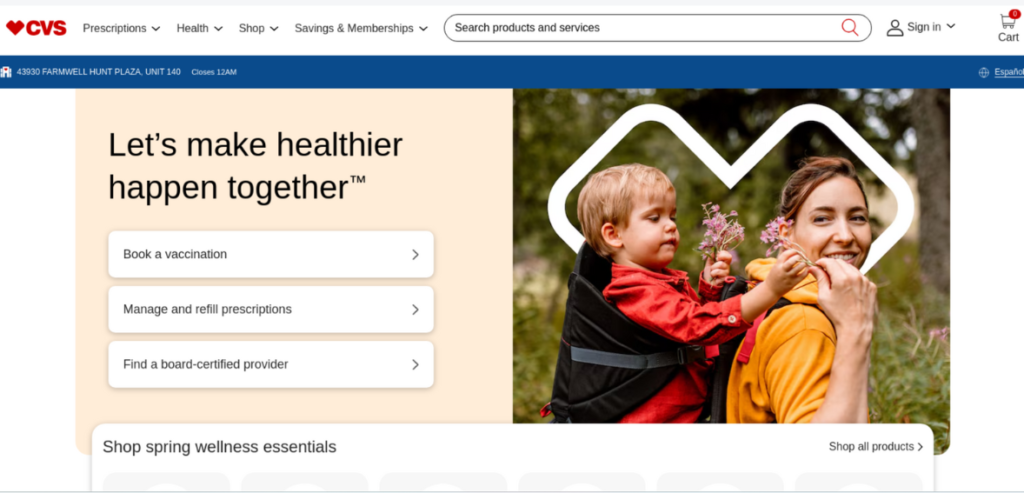CVS is set to close numerous pharmacies situated within Target stores at the beginning of 2024, according to a statement from a company representative. These closures reflect the challenges that retail pharmacy chains in the US are encountering with their prescription services and workforce management. CVS spokesperson Amy Thibault explained that the affected pharmacies will be shut down between February and April as part of CVS’s strategy to optimize the spacing of its stores and pharmacies nationwide.
Key Takeaways
- Strategic Store Closures: With plans to restructure the existing retail footprint across the country, CVS Health has decided to shut down the selected pharmacy stores, mainly within Target, at the end of the current calendar quarter. This process, already underway from February to April 2024, focuses on adapting to patients’ needs.
- Workforce Reductions and Store Closures: CVS proposes to lower its workforce by 5000 workers and shut down around 900 stores between 2022 and 2024, while there are roughly 600 stores that have already been closed the year before. The affected employees will be offered the same or equivalent position in the company as it reviews its business strategies in the face of market challenges.
- Market Realignment: CVS is closing Target pharmacies based on analyzing population shifts, consumer behavior trends, and future healthcare needs. To ensure convenient pharmacy services in the most suitable places, CVS proposes decreasing the number of store and pharmacy locations.
- Diversification and Growth Strategy: The company showed resilience during the industry crisis, which was led mainly by management strategies to expand beyond traditional retail. Sales in medical care services and health service divisions increased, indicating a reorientation towards further development of health care benefits. Recent investments, such as purchasing senior primary healthcare offices and a home care company, highlight CVS’s broadening healthcare product line.
CVS Health’s Strategic Shift: Store Closures, Workforce Reductions, and Market Realignment
Earlier in January this year, CVS Health unveiled plans to shut down certain pharmacy stores located within Target stores over the first few months of the year. According to a spokesperson, this process, which began in February and is scheduled to conclude by the end of April, will mark a significant shift in the outlook of CVS’s future as it reassesses its business strategies.

Before these pharmacies close, prescriptions will be shifted to a nearby CVS Pharmacy. This move comes when pharmacy chains in the US, like CVS and its competitor Walgreens Boots Alliance, seek ways to implement cost-cutting measures amidst reduced consumer spending and heightened market competition due to inflation concerns.
Labor issues have also been said to contribute to the company’s challenges. CVS has announced its plan to reduce its workforce by 5,000 individuals and close approximately 900 stores between 2022 and 2024 (out of which approximately 600 locations closed last year). Employees affected by the closures will be offered equivalent positions elsewhere.
According to a spokesperson, the decision to close these pharmacies stems from their analysis of shifts in population, consumer purchasing behaviors, and anticipated healthcare demands. This strategic move aims to align the pharmacy format with patient needs by optimizing location placement.
Continuing the same statement, CVS said closures are part of their strategy to realign their national retail footprint, reducing store and pharmacy density. The aim is to ensure they have the appropriate pharmacy format in suitable locations to effectively serve patients.

In recent quarters, retail pharmacies have faced challenges in boosting profits because of a decline in foot traffic caused by the COVID-19 pandemic and a shift towards online prescription services. Last year, Rite Aid, a major drugstore chain, filed for bankruptcy. Despite these industry struggles, CVS reported third-quarter solid earnings with $89.8 billion of revenue, which increased by 10.6% YOY. Plus, the operating income was a solid $3.7 billion. However, most of these gains were attributed to the company’s strategic efforts to diversify its business from traditional retail. Sales in its healthcare benefits division increased by nearly 17%, while health services grew by 8.4%.
In 2015, CVS acquired Target’s pharmacy business for $1.9 billion. It operates around 1,800 pharmacies within Target’s 1,950 US locations, for about 9,000 pharmacy locations nationwide. CVS has shifted its focus towards expanding its medical care services. In the past year alone, the company has invested nearly $20 billion in expanding its senior primary care centers, with a $10.6 billion acquisition of Oak Street Health and $8 billion in a homecare company, Signify Health.
About CVS Health
CVS Health Corporation is a healthcare solutions provider based in the United States. Its operations are divided into three segments: Health Services, Pharmacy and consumer Wellness, and Health Care Benefits. The Health Care Benefits part offers different types of health insurance and services. It works with many other groups and people, such as students, workers, health plans, and government programs.

Image source
In the Health Services section, CVS manages pharmacy benefits. This means they help design and manage drug lists (formularies) and health plans, mail-order and specialty pharmacies, and handle clinical support to employers, insurance companies, and government entities. The Pharmacy & Consumer Wellness segment sells prescription and over-the-counter drugs and consumer health and beauty products. It also operates various pharmacy outlets, including retail stores and online pharmacies, and offers ancillary services to care facilities.
Formerly known as CVS Caremark Corporation, the company rebranded as CVS Health Corporation in 2014. Established in 1996, it is headquartered in Rhode Island. The Pharmacy & Consumer Wellness part is where CVS sells medicines, beauty products, and more. They have an extensive network of stores, online websites, and even pharmacies in places like long-term care facilities. They offer advice and services to help manage medications and health.
Conclusion
CVS’s decision to close pharmacies within Target stores reflects a strategic effort to optimize its national retail footprint amidst evolving market dynamics. The move, part of a broader strategy to align pharmacy formats with shifting patient needs and optimize store locations, signifies a proactive approach to ensure effective service delivery. While workforce reductions and store closures may present short-term challenges, CVS’s focus on market realignment and diversification underscores its commitment to long-term growth and sustainability.
Despite industry challenges, CVS has shown resilience and adaptability to navigate the evolving healthcare landscape. Its solid earnings and strategic investments in healthcare services have demonstrated its commitment to providing healthcare solutions, positioning the company for continued success. As CVS Health continues to evolve its business model, it remains steadfast in delivering healthcare solutions to meet the needs of communities nationwide.

